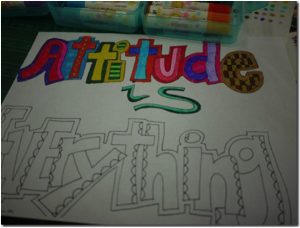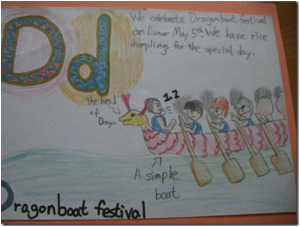Changing Lanes and Marching 0n
(What I have learned from working with YLs)
In my opinion, there are two kinds of people that work like mirrors and oftentimes they unknowingly help us learn more about ourselves. Our partner can do that: he or she reacts to our thoughts and actions and in a way reflect our image. Our students can also do that: they are the great reminders of ideas and concepts we’ve taken for granted as time goes by. They help you realize what you are good at and areas you need to work on. Be it adults or children, what we teachers can learn from our students is usually the key for better teaching and learning.
I’m been undergoing a transitional phase in my career this semester after walking away from my comfort zone as an EFL teacher for 10 years and starting fresh as a homeroom teacher. It is no easy step. It’s a bazaar feeling to start learning to teach like a NQT after 10 years but the experience is truly amazing. I learned more about these ‘little people’ and in a way my students have taught me how to fit in the new role. I felt I’m seeing teaching from fresh perspectives and have learned quite a lot from my children. So to celebrate my halfway up to the first year as a homeroom teacher, I’d like to share some thoughts about teaching little devils young learners.

Remix teaching material
The textbook is usually the thing I have kids to get out at the end of the class. I believe that a textbook, regardless of its formality and quality, is supposed to be a guideline, a tangible object for students/teachers to fall back on; while real learning takes place in a more ‘intangible and messier’ way. I often remind myself to embed at least three different teaching media in a 40-minute session. The combinations can be various; they can be good-old-fashioned blackboard drills, interactive whiteboard games, or individual writing games. It’s the teachers’ interpretation of the language material that connects the textbook with real life. The ritual of opening the book at the end of the class serves the purpose of organizing/rephrasing prior ideas into clear concepts and logics. At the meantime, it’s also a good idea to do some individual quiet work so children have the time to reflect on learnt material.
Embed learning strategies in teaching
Have children organize teaching material with graphics and diagrams. You can always start from a simple T-chart then gradually progress to more complicated charts such as a Venn diagram. The practice not only reinforces vocabulary but also personalizes the language material. Moreover, learning strategies are embedded so children can start developing their own learning system. And it’s all part of the scheme of nurturing successful learners’ autonomy. Visual clues should be put out all year round and updated in an appropriate manner.
Having fun is always the best motivation
Little people learn from doing. They learn from enjoying the sense of achievement. For children, singing and dancing is always the best trick to get them involved in the class. However, it’s the ‘extra mile’ you lead them to afterwards which determines if the fun part compliments the learning. Even the roll-calling task at the beginning of the semester can lead to a meaningful and active learning process (Read a sample lesson plan here and here).
Step back and wait for it
For many Taiwanese EFL teachers, the challenge we face everyday is that true beginners sit side by side with advanced students, yet they share the same classroom, under the guidance of the same teacher in the same time frame. Our long tradition of cram school system, meaning after-school English education, makes sure public school teachers have a hard time setting reasonable goals and make effective lesson plans. After years of battling with the reality, I finally realized that teachers also need to step back and let the material sit in for a while. Not just for the students, but also for the teachers, to have time to do individualized learning activities. This is especially important if the routine learning hour does not meet the requirement of sufficient language exposure. Patience and keen observance can help you pick up the holes and patch them up before they got too big.
Helping them to take ownership of the language
Needless to say, this is where language learning started to make sense for learners. However, for YLs, especially in an EFL country, taking ownership of the language material may require a long time. In this case, try customizing the available material. I’ve had my kids grouped in teams make their own team songs AND draw matching posters (Read OUP project here). We end up creating 5 different lyrics and accompanying posters from 1 song. My children even claimed, ‘It’s MY song!’ Additionally, making alphabet books with local themes also encourages applying the language plus easier to do differentiated teaching (See alphabet books sample here).

Teachers need to experience the ‘FIRSTS’ as well
After years of teaching in the same context/position, we all need a break from fixed routine and maybe a couple of new thinking caps. If changing lanes is too dramatic for you, try to do experiments in your class. Try out the methods/projects you’ve long known exist but never get to put them into practice. Engage in local/international-wised projects so you can do your lesson planning from a new angle (See my International Exchange Project here). I’m especially fond of this interview of Jamie Lee Curtis where she said that we adults should have our share of ‘firsts’ to ‘celebrate the every day bravery’. So I’m embracing my journey as a NEW teacher starting from 2012. I was reborn again in that sense! Haha!


 Any blog or online link you’d like to recommend?
Any blog or online link you’d like to recommend?